How To Disinfect A Chicken Coop: An In-Depth Review From Personal Experience
- February 8, 2024
- 0 comment
Throughout my journey as a poultry keeper, I’ve come to understand the critical importance of ensuring a clean and hygienic living space for my chickens. It’s become clear to me that their well-being and overall happiness are directly linked to the cleanliness of their environment. Consequently, the task of disinfecting the chicken coop is one I approach with a high degree of seriousness.
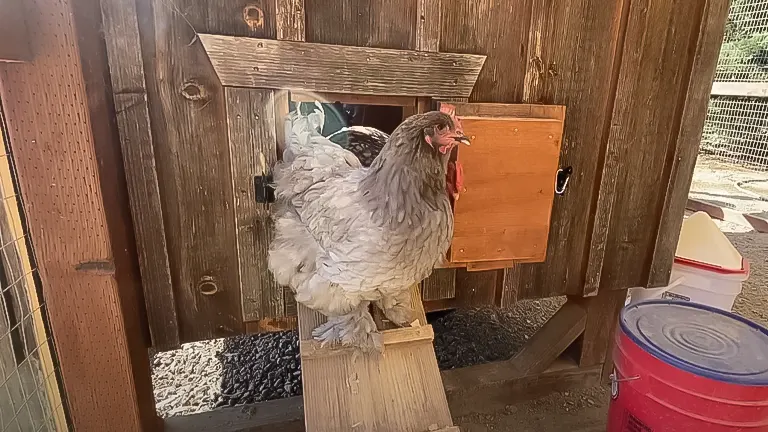
Over the years, I’ve experimented with a wide range of cleaning methods and products, all in the pursuit of identifying the most efficient and effective strategies for maintaining a pristine coop. In this detailed review, I aim to share the valuable insights I’ve gained from these experiences.
I’ll provide a thorough evaluation of the various disinfecting techniques I’ve tested, discussing their levels of effectiveness and offering recommendations tailored to suit the needs of different poultry enthusiasts, from the novice backyard chicken keeper to the more experienced farmer.
List on How To Disinfect A Chicken Coop:
The Importance of a Clean Coop
Understanding the significance of maintaining a clean chicken coop cannot be overstated, as it forms the cornerstone of poultry health and welfare. A coop that is not regularly cleaned and disinfected becomes a breeding ground for a variety of harmful pathogens, parasites, and persistent odors, creating an environment that is not just unpleasant but also stressful and potentially dangerous for the chickens residing within.
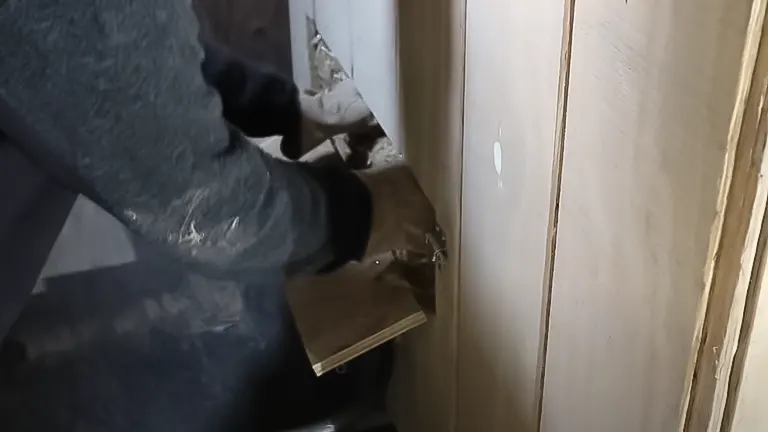
Such stress not only affects the birds’ well-being but also compromises their immune systems, making them more susceptible to diseases. Diseases such as coccidiosis, avian influenza, and salmonella, which can rapidly spread through a flock, are particularly concerning. These diseases can not only cause significant morbidity and mortality within the flock but can also pose risks to human health in certain cases.
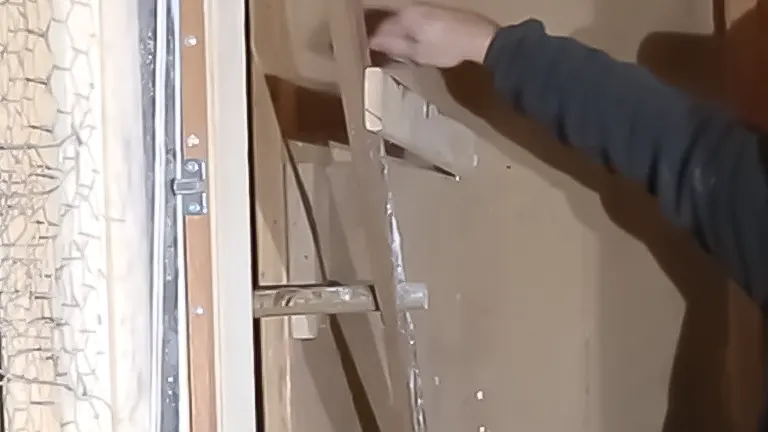
By implementing regular disinfection routines, chicken keepers can effectively manage these risks, ensuring that the environment within the coop remains healthy and conducive to the birds’ long-term health and productivity. This preventive measure is key to fostering a safe and thriving environment for poultry, underlining the essential role that cleanliness plays in the management of a successful and sustainable coop.
4 Methods For Sanitizing A Poultry Enclosure
Method 1: Vinegar and Water Solution
Utilizing a vinegar and water solution for cleaning the chicken coop offers a natural, safe, and eco-friendly approach to disinfection. This method involves mixing white vinegar with water, typically in a 1:1 ratio, and using the mixture to clean surfaces within the coop.
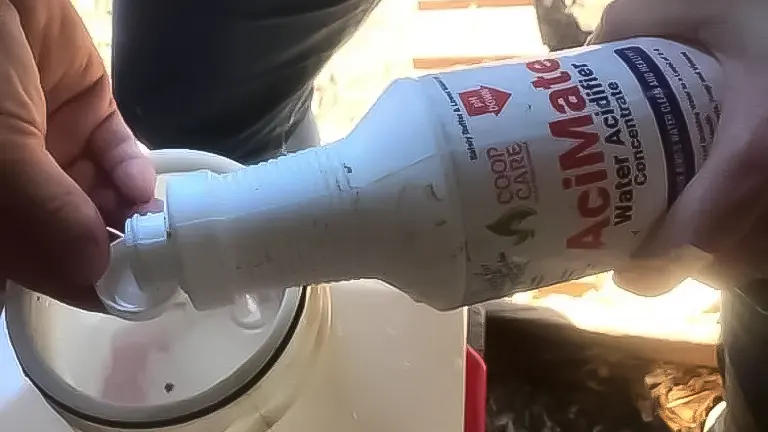
The acetic acid in vinegar acts as a mild disinfectant, effective at breaking down dirt, grime, and some bacteria, making it suitable for regular cleaning tasks.
While it may not kill all pathogens, its non-toxic nature ensures it’s safe to use around chickens, posing no harm if ingested or inhaled. This method is particularly appealing for those seeking an affordable and readily available option for maintaining coop cleanliness without introducing harsh chemicals into the environment.
Pros
- Natural and safe for chickens.
- Inexpensive and readily available.
Cons
- Less effective against stubborn pathogens.
- Requires more frequent application.
Effectiveness 8/10: For routine cleaning, a vinegar and water solution is my go-to. It’s safe, natural, and does a decent job of keeping the coop smelling fresh. However, it might not be the best choice for deep cleaning or outbreaks of disease, as its disinfectant properties are milder compared to chemical solutions.
Method 2: Commercial Poultry Disinfectant
Commercial poultry disinfectants are specifically formulated to meet the stringent sanitation needs of poultry environments. These products are engineered to combat a wide array of pathogens, including bacteria, viruses, and fungi, that commonly afflict chicken coops.
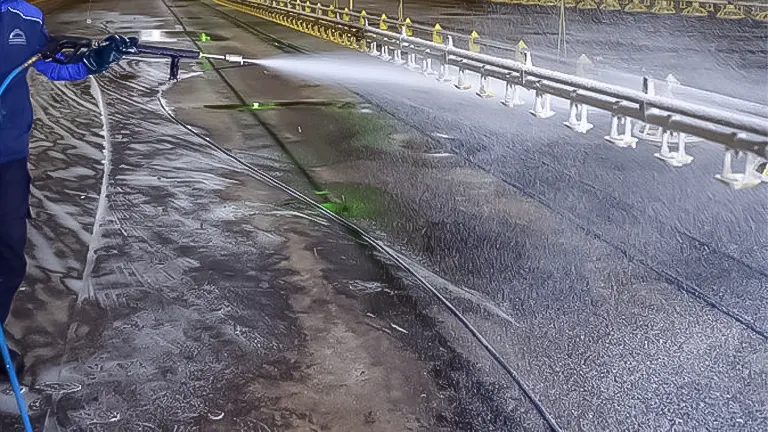
Their effectiveness is grounded in their potent chemical compositions, which are designed to ensure the highest standards of biosecurity. While they offer a high level of disinfection, it’s crucial to follow the manufacturer’s instructions carefully regarding dilution, application, and safety measures to protect both the poultry and the person applying the product.
Although these disinfectants are more costly than homemade solutions, their targeted action and efficiency make them a valuable tool for deep cleaning or outbreak management.
Pros
- Specifically designed for poultry coops.
- Effective against a wide range of pathogens.
Cons
- More expensive than homemade solutions.
- Chemicals can be harmful if not used correctly.
Effectiveness 10/10: Commercial poultry disinfectants are my choice for monthly deep cleans or whenever there’s been an illness in the flock. These products are highly effective, but it’s important to follow the instructions carefully to ensure the safety of your chickens.
Method 3: Bleach Solution
A bleach solution is a highly effective disinfectant known for its potent antimicrobial properties. When diluted correctly—usually one part bleach to ten parts water—it becomes a powerful tool for sanitizing the chicken coop, capable of killing a broad spectrum of pathogens.
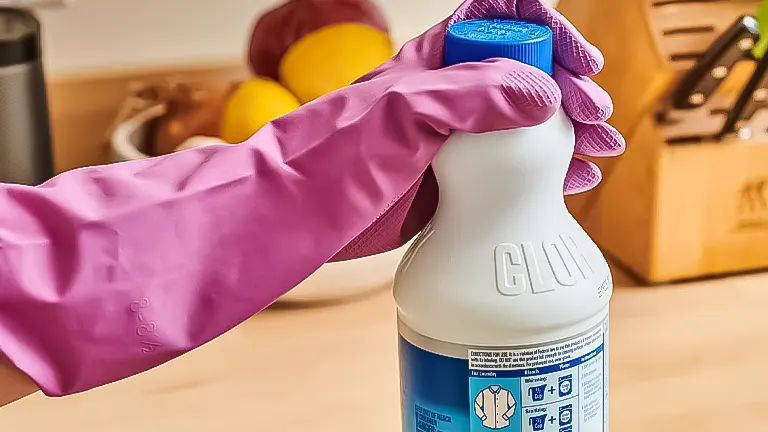
Its efficacy extends to some of the most stubborn and dangerous germs, ensuring a high level of cleanliness. However, due to its corrosive nature, it’s essential to use it with caution, ensuring that the coop is well-ventilated during cleaning and that all surfaces are thoroughly rinsed afterward to prevent any residual bleach from harming the chickens.
Despite its effectiveness, the need for careful handling and the potential for material damage over time are considerations that must be weighed.
Pros
- Highly effective disinfectant.
- Cheap and widely available.
Cons
- Can be harmful to chickens if not rinsed thoroughly.
- Corrosive and can damage coop materials over time.
Effectiveness 8.5/10: Bleach is a powerful disinfectant, and I reserve its use for serious cleaning needs, such as disinfecting the coop after an illness. It’s critical to dilute it properly and ensure the coop is well-ventilated and rinsed thoroughly after cleaning to prevent harm to your chickens.
Method 4: Steam Cleaning
Steam cleaning represents a modern, chemical-free method of disinfecting the chicken coop, utilizing high-temperature steam to penetrate and clean surfaces. This method is highly effective at killing bacteria, viruses, and parasites, including those resistant to chemical treatments.
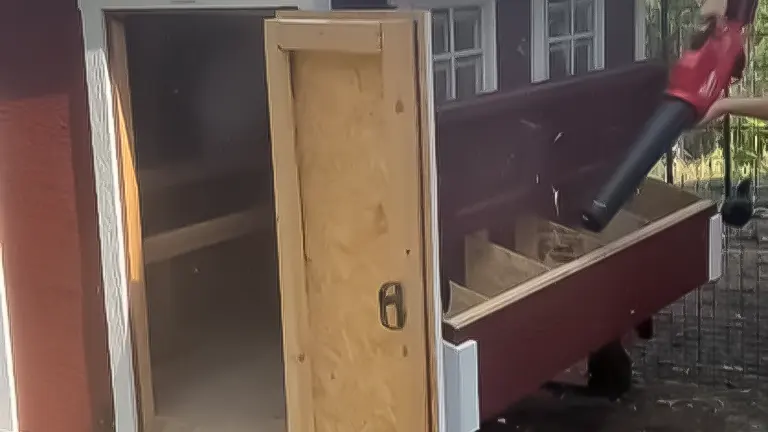
Steam cleaning also offers the advantage of reaching difficult-to-clean areas and crevices, ensuring a more thorough sanitation process without the use of harmful chemicals.
While the initial investment in a steam cleaner may be higher compared to other methods, the long-term benefits of a safe, environmentally friendly, and efficient cleaning process make it an attractive option for those prioritizing the health and safety of their flock and the sustainability of their cleaning practices.
Pros
- Uses no chemicals, making it safe for chickens.
- Effective against mites and lice as well as pathogens.
Cons
- Requires special equipment.
- More time-consuming than other methods.
Effectiveness 9/10: Steam cleaning is a fantastic option for those looking to avoid chemicals. It’s very effective at penetrating deep into the coop’s nooks and crannies, killing pathogens and pests. The main downside is the need for a steam cleaner, but it’s a worthwhile investment for the health of your flock.
Decision-Making Factors For User’s
When choosing a disinfection method, consider the following:
- Safety for Chickens: Always choose methods that are safe and non-toxic to your birds.
- Effectiveness Against Pathogens: Some methods are better suited for routine cleaning, while others are necessary for deep disinfection.
- Cost and Availability: Evaluate the cost and whether the required materials are easily obtainable.
- Ease of Use: Consider how much time and effort each method requires.
Related Articles:
- Best Bedding For Chickens
- Best Safe Chicken Coop Heater
- 8×8 Chicken Coop Plans
- Turning a Shed Into a Chicken Coop
- How to Make a Chicken Coop Out of Pallets
- Best Sand for Chicken Coop
- How To Insulate a Chicken Coop
- How To Heat a Chicken Coop
- How To Keep Water from Freezing in Chicken Coop
- How to Build a Chicken Coop
- How To Build Chicken Nesting Boxes
- How to Raise Happy and Healthy Chickens in Your Backyard
- When Can Chicks Go Outside? Timing and Tips for a Smooth Transition
- 12 Reasons why Ducks are Better than Chickens
- Best Automatic Chicken Coop Doors 2024: Expert Reviews & Buyer’s Guide
- Best Fans for Chicken Coop 2024: Effective Cooling Solutions Reviewed
Final Assessment
Based on my experience, I’ve determined that the most effective strategy for maintaining a sanitized chicken coop involves a two-pronged approach: routine cleaning using a mixture of vinegar and water, complemented by thorough, deep-cleaning sessions with a specialized commercial poultry disinfectant monthly. This method strikes an optimal balance between ensuring a high level of cleanliness, safeguarding the health and safety of the chickens, and being economically viable. It’s critical to underscore that the overall well-being of your poultry depends significantly on consistent cleaning practices, not merely the selection of disinfection methods.
It’s important to keep in mind that the foundation of a thriving poultry environment is rooted in regular upkeep. A commitment to keeping the coop clean directly translates to healthier, happier chickens. In turn, a well-maintained coop fosters a sense of satisfaction and well-being among chicken keepers, creating a positive cycle of care and contentment.
Frequently Asked Questions
- Why is it important to disinfect a chicken coop?
Disinfecting a chicken coop is crucial to prevent the spread of diseases, eliminate harmful pathogens, parasites, and manage odors. It helps ensure the health and well-being of your chickens by creating a clean and safe environment for them to live in. - How often should I disinfect my chicken coop?
Regular cleaning should be done weekly, with a more thorough disinfection process taking place monthly. However, the frequency may increase depending on the size of your flock, the coop’s cleanliness, and any outbreak of diseases. - Can I use vinegar to disinfect my chicken coop?
Yes, a solution of vinegar and water can be used for routine cleaning due to its natural disinfectant properties. It’s safe for chickens and helps in reducing odors and controlling mild bacterial growth. - Are commercial poultry disinfectants safe for my chickens? Commercial poultry disinfectants are designed to be safe for use around chickens, as long as you follow the manufacturer’s instructions regarding dilution, application, and ensuring the coop is well-ventilated and dry before reintroducing your chickens.
- Can bleach be used to disinfect a chicken coop?
Bleach is a powerful disinfectant and can be used in a diluted form for deep cleaning. Ensure proper ventilation, dilute correctly, and thoroughly rinse and dry the coop to prevent any harm to your chickens. - What is steam cleaning, and how effective is it for disinfecting chicken coops?
Steam cleaning uses high-temperature steam to kill bacteria, viruses, and parasites, making it an effective and chemical-free method for disinfecting a chicken coop. It’s particularly good for reaching tough spots and crevices where pathogens might hide. - How do I prepare my chicken coop for disinfection?
Remove all chickens, bedding, feeders, and waterers from the coop. Sweep and remove any dirt, debris, and droppings before applying your chosen disinfectant. - What safety precautions should I take when disinfecting my chicken coop?
Wear protective gear such as gloves, a mask, and goggles to protect yourself from chemicals and dust. Ensure the coop is well-ventilated during and after the disinfection process. - How long should I wait before putting my chickens back in the coop after disinfecting?
Wait until the coop has thoroughly dried and aired out after disinfection. This time can vary depending on the disinfectant used and the weather, but generally, 24 hours is sufficient for most disinfectants. - Can disinfecting a chicken coop help prevent external parasites like mites and lice?
Yes, regular disinfection can help control the population of external parasites by destroying their habitats and eggs. However, specific treatments may also be necessary for severe infestations.
We’re eager to hear from you! Share your own experiences and insights on disinfecting chicken coops in the comments section below. Your personal tips and stories could greatly assist fellow poultry enthusiasts in creating safer and healthier environments for their flocks. Let’s help each other make well-informed choices when it comes to maintaining our chicken coops!

Edward Smith
Forestry AuthorWoodworking is about more than crafting; it's a harmonious connection with nature, mastering tools, and preserving our environment. I'm here to share my knowledge and experiences with you, forging a future where we can embrace wood's beauty and utility while safeguarding our forests' health and diversity.





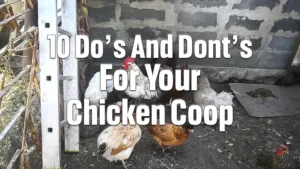
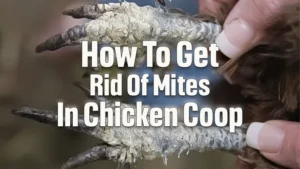
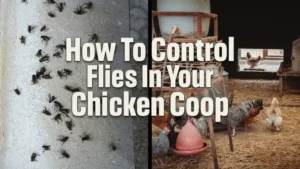


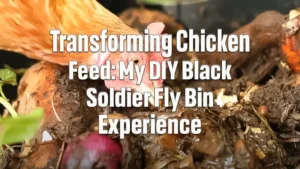

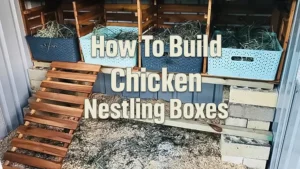
Leave your comment